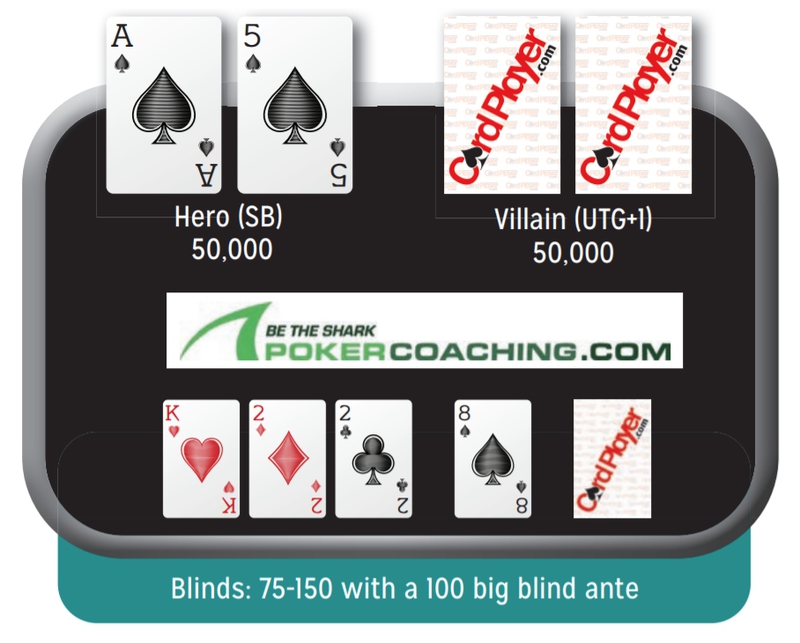






PokerCoaching Hand Quiz: Barreling Off In A Multi-Way Pot Out Of Positionby Card Player News Team | Published: Nov 17, 2021 |
|
|
Join more than 120,000 players worldwide who have taken their game to the next level. To develop your poker skills and learn how to crush games, check out PokerCoaching.com.
Key Concept: Barreling Off In A Multi-Way Pot Out Of Position

Early in a nine-handed $10,000 buy-in tournament, an unknown player UTG+1 limps at 75-150 out of his 50,000 stack. Everyone folds to you in the small blind with A 5
5 .
.
Question 1: Should you fold, call, raise to 400, or raise to 700?
Answer: In this situation, both calling and raising to 700 are fine options. If you expect to have no preflop fold equity against the initial limper and you think you may get reraised some portion of the time, call and see the flop. If you think the initial limper will either call or fold, and will then play timidly post-flop, raising is probably ideal.
Raising small does not make sense because then you have no preflop fold equity at all, resulting in you playing a medium-sized pot from out of position. Not to mention that you can still get reraised. Folding is out of the question because A 5
5 is way too strong.
is way too strong.
This time you raised to 700 and both the big blind and initial limper called. The flop came K 2
2 2
2 .
.
Question 2: Should you check, bet 600, bet 1,500, or bet 2,200?
Answer: This is a spot where the board does not connect especially well with any player’s range. It is worth noting that no player should have trips because most players will not call a raise to 700 with many hands containing a deuce. So, the question becomes who has the better kings in their range?
Given you would raise A-A, A-K, and K-Q, and your opponents would probably have raised or reraised with those hands, betting small with your entire range is fine even though you will get called a decent amount of the time.
Make a point to not bet too large because then when you get called you will be against a strong range that will be unlikely to fold to aggression on the turn or river. By betting small, you keep your opponents in with some hands they will fold on the later betting rounds like underpairs, ace high, queen high and backdoor draws.
Checking with the intention of folding to a bet would also be fine if you are reasonably sure one of your opponents connected with the board based on a live read.
You bet 600 and only the initial limper calls. The turn is the 8 .
.
Question 3: Should you check, bet 1,000, bet 2,000, or bet 8,000?
Answer: This is a tricky situation where your play will often depend on your opponent’s tendencies. You will have lots of kings that would definitely want to continue betting, which allows you to have some bluffs in your range if you want to be balanced.
While this ace high may look like it has some showdown value, it does not. Instead, it should be used as a bluff. Using an ace as a bluff is especially beneficial because when you happen to be against a king, you have three outs to the best hand. So, play this hand like you would play a king, which would be to bet 2,000.
This time you bet 2,000 and your opponent folded, giving you a nice pot due to sheer aggression. Good decision!
For access to more than 1,200 interactive poker hand quizzes just like this, but in video format, visit PokerCoaching today.
Features
Tournaments
Strategy
Commentary & Analysis